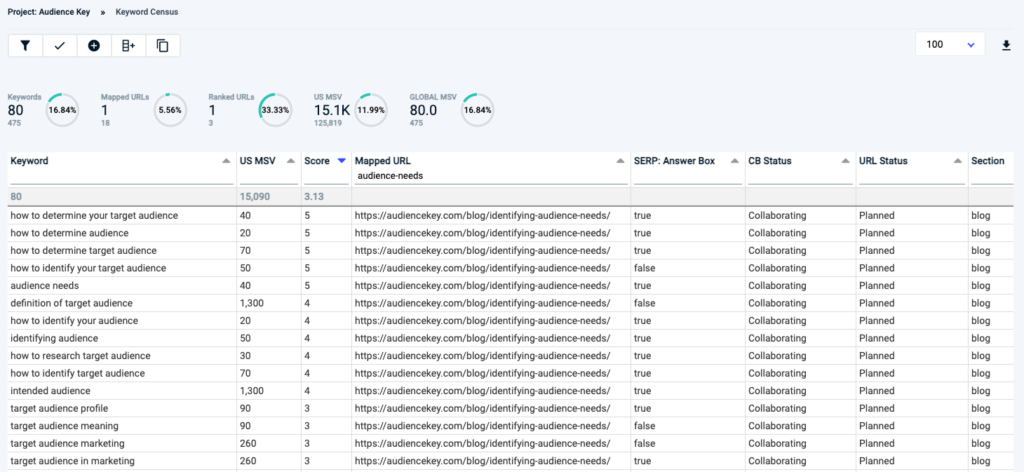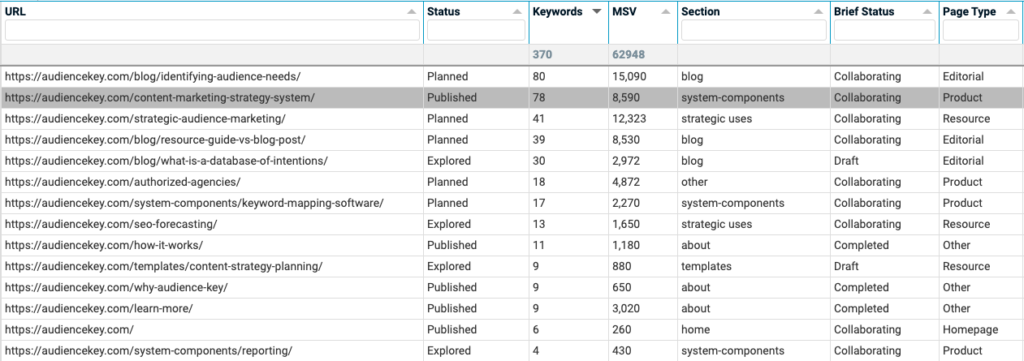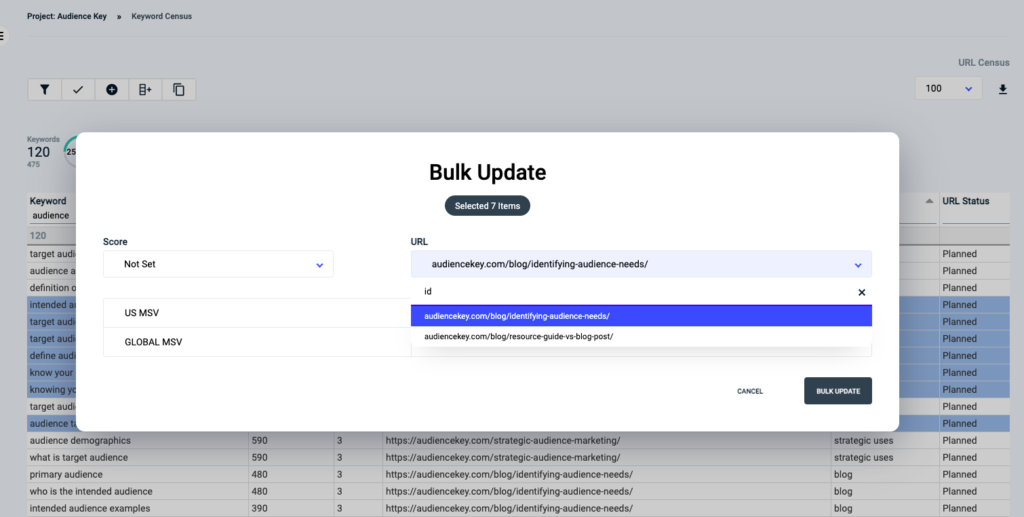Facilitate collaboration, increase productivity, and automate content strategy brief creation with our keyword mapping software.
If you have tried keyword mapping in spreadsheets, get ready for a whole new level of experience that dedicated mapping software provides.
- Cloud Based for team collaboration and no issues with file version control
- Advanced Filters built specifically for keyword mapping allow fast, efficient workflow
- Bulk Updating features to quickly update mapping and scoring decisions
- Quick Add & Bulk Import features to easily add new keyword discoveries and grow your strategy
- Seamless Data Integration technology automatically keeps your mapping, ranking, and SERP feature data up to date
What is Keyword Mapping?
Keyword mapping is core foundational work for developing SEO and content marketing strategy. Assigning each term in your keyword research list to a page (existing or prospective) leads to clear decisions on how to best organize your content as well as optimize or create it.
The Amazing Outcome of Mapping Your Keywords
The upfront work of mapping your keywords to pages yields several long term dividends to your organic search strategy. Once every keyword phrase is mapped to its intended page, a powerful sense of clarity emerges. Benefit highlights include:
- An effective and scalable way to organize your site’s content and information architecture
- Data driven decisions as to what content to develop and in what priority
- Actionable organized data to inform decisions around content creation and optimization
- Avoiding keyword cannibalization and blurring by not having multiple pages optimized for the same terms
- Reporting that is tied to the strategic plan being acted upon
- Organic traffic estimating by page, section, or global account

Use Multiple Sources of Keyword Research Data
Correctly done, comprehensive keyword research is constructed from an amalgamation of data sources.
Search Console & Keyword Planner (from Google), SpyFu, Semrush, ahrefs, Moz, Keywords Everywhere, Answer The Public…and dozens of more sources. Never has so much keyword research data been so widely available. But how best to organize all this data to create actionability?
Use Audience Key to centrally organize an amalgamation of keyword data sources
Our keyword mapping software makes it easy to organize (tens of) thousands of keywords into a coherent, data-driven content roadmap plan. The system then automatically relates each mapping into a content brief, which serves as a centralized place for strategy collaboration and integrated data about the page.
Key Concept: Don’t think of your keyword research as a list: think of it as a database of intentions
Pre-Mapping Setup: Software to Organize & Analyze Your Keywords
Organize your keywords. Organize your page URLs.
Keyword Census
The Keyword Census serves as a keyword organizer tool and repository of all your keywords and their respective data points. The keyword mapping tools built into the Keyword Census serve segment & organize your keyword strategy with ease and flexibility.
- Keyword Attribute technology for fast efficient word grouping by attribution
- Which terms refer to color, size, flavor, price sensitivity, etc.
- Ranking technology to gather baseline ranking URL and position
- Relevancy Scoring to segment your list into relevancy segments
- Not all keywords are of equal strategic importance – scoring allows helping segmentation
- Keyword Difficulty score to aid in decision making
- SERP Feature Identification to identify which SERP features exist for each keyword phrase
- Answer Box, People Also Ask, News Results, Local Map Results, etc.

URL Census
The URL Census serves as a repository of all your page concepts – be they published pages, early concept explorations, or anywhere in-between.
- Status Management for all URLs to easily organize your roadmap
- Explored, Proposed, Planned, Published, Sidelined
- Grouping & Attribution features to organize and segment URLs by page type, section, persona, funnel stage, and more.
- Content Briefs are automatically created for each URL to chronicle pre-writing or pre-optimization strategy, bringing the data to the forefront of the content process to ensure implementation decisions are aligned with upfront strategy.

Content Mapping: Software Tools to Efficiently Organize and Collaborate
Keyword and content mapping software integrates the relational data between your Keyword Census, URL Census, ranking data, and keyword SERP feature data into one centralized place.
- Advanced Filters built specifically for keyword mapping allow fast, efficient workflow
- Bulk Updating features to quickly update mapping and scoring decisions
- Quick Add & Bulk Import features to easily ad new keyword discoveries
- Cloud Based facilitates easy collaboration and no issues with file version control
- Data Integration technology automatically keeping your mapping, ranking, and SERP feature data up to date

Website Mapping Strategy
Mapping is a one-to-many process: many keyword terms are mapped to one page, but a keyword term relates to only one specific page. A thorough mapping process is critical when it comes time to optimize a page, as well as avoid unintentionally optimizing multiple pages for the same phrase clusters (which in turn creates keyword blurring).
How to Map a Website: The Keyword Mapping Process
Keyword mapping is an iterative process. Mapping software tools make rapid iteration much faster and easier. Start with mapping lots of keywords to a main content page. From there, it becomes clear you have ‘too many’ keywords for one page to effectively handle, usually because the keywords cover too many disparate topics for one page to optimally support. Advanced keyword filters make it easy to segment themes and clusters inside your mapping. Create new child subpages on the fly, and iteratively syphon off terms to these more specific pages. A couple of rounds of this iterative process brings fine-tuning and clarity to an evolving strategic content map.
Keyword & Content Mapping FAQ
Q: When organizing keywords how many keywords should be mapped to a single page?
A: There’s no one-sized answer to this question. Longer form content may contain many sections covering a broad number of subtopics: this can lead to 100+ keywords mapped to a page. Shorter form content, or a page focused on a niche topic, may have less than 10 keywords. A general guideline is to give greater scrutiny to mapping decisions when over 40 keyword phrases are mapped to a single page.
Q: How do keywords get added to an Audience Key account?
A: Two main options exist: a bulk import feature allows a quick and easy way to add in your entire starting list through a simple csv upload process. A ‘Quick Add’ feature allows for adding new keywords on the fly in seconds. For new accounts, we offer white glove support for initially seeding your account as well.
Q: Is it difficult to change mapping decisions?
A: Updating your mapping is super easy whether for a single keyword term or hundreds of terms in one fell swoop using the bulk modifier feature. Changes to mapping instantly update your content brief as well, one of the many benefits of a connected system.
Q: Currently I use spreadsheets to map my keywords, what’s better about using Audience Key’s keyword mapping software?
A: While spreadsheets are always an option, mapping software offers all kinds of advantages. The speed of the process is highly accelerated with the use of filtering and segmentation technology developed expressly for the mapping process. It also allows for ease of collaboration allowing multiple users to add and update without the concern of version control. Finally, unlike spreadsheets, the mapping software is connected to content briefs, workflow screens, and reporting, making an update in one area instantly synchronized across the system.

